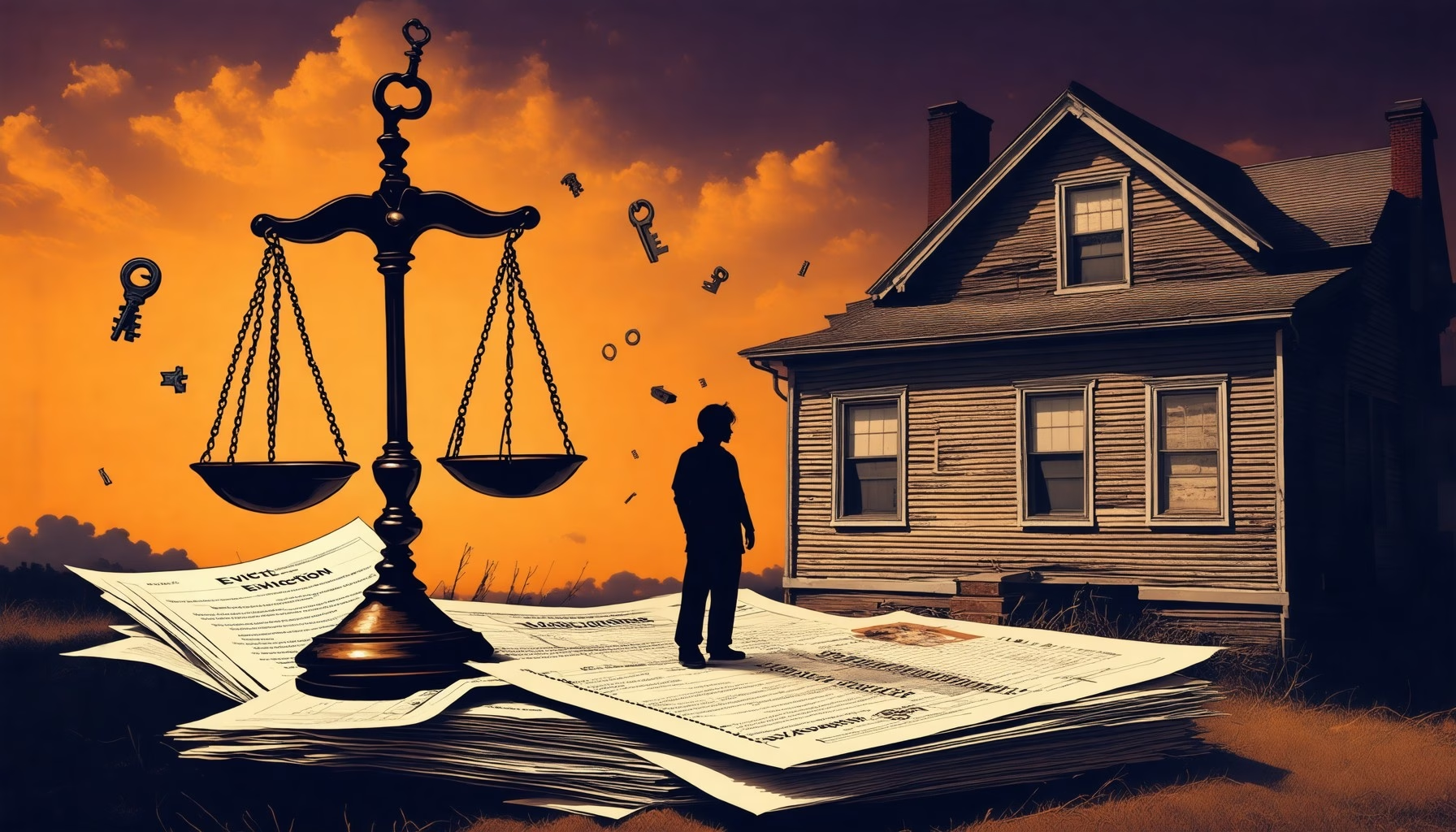Key Takeaways
- Understand the eviction timeline in South Dakota to effectively prepare your response to eviction notices.
- Be aware of your tenant rights, including the right to a habitable living environment and protection against unfair eviction practices.
- Consider filing a counterclaim if facing eviction due to habitability issues or improper notices.
- Explore options for securing rental housing even after an eviction, such as offering a larger deposit or providing references.
- Utilize available resources, including legal aid organizations, to navigate eviction processes and protect your rights as a tenant.
Facing an eviction can be a daunting experience, especially in South Dakota, where understanding your rights and the legal processes involved is crucial for navigating this challenging situation. In this article, we will explore how to fight an eviction in South Dakota, providing you with essential insights and strategies to protect your rights as a tenant. We will delve into the eviction timeline, the legal framework surrounding South Dakota eviction laws, and the steps you can take to request a hardship stay if you find yourself in a difficult position. Additionally, we will discuss the possibility of counterclaims in eviction cases, the costs associated with evictions, and what your options are for securing a rental after an eviction. By the end of this article, you will have a comprehensive understanding of the eviction process in South Dakota and the resources available to help you advocate for your rights effectively.
Understanding the Eviction Process in South Dakota
Eviction can be a daunting experience for tenants in South Dakota. Understanding the eviction process is crucial for anyone facing this situation. The timeline and legal framework surrounding evictions can significantly impact your rights and options. Here, we will explore the eviction timeline and the factors that influence how long an eviction may take.
Overview of the Eviction Timeline
The eviction process in South Dakota typically follows a structured timeline, which includes several key steps:
- 3-Day Notice: Landlords must serve a three-day notice to quit and vacate for non-payment of rent or lease violations. This notice is crucial as it initiates the eviction process.
- 30-Day Notice: For month-to-month tenancies, landlords can terminate the lease without cause by providing a 30-day notice. This allows tenants time to find alternative housing.
- Other Violations: In cases of lease violations not related to rent, landlords must provide a notice that gives tenants a reasonable timeframe to rectify the issue.
- Filing an Eviction Lawsuit: If the tenant does not vacate after the notice period, the landlord can file an eviction lawsuit in the appropriate court. This step is essential for legal proceedings.
- Summons and Complaint: The tenant must be served with a summons and complaint, which formally begins the legal action against them.
- Tenant’s Response: Tenants have four days to respond to the summons and complaint with an official Answer. This response is critical as it can influence the court’s decision.
- Court Hearing: If the tenant responds and asserts their right to remain, a court hearing will be scheduled to evaluate the eviction claim. This process can take several weeks depending on court availability.
- Court Order: If the tenant fails to respond or loses the case, the landlord can obtain a court order allowing the sheriff to carry out the eviction.
- Execution for Possession: After a judgment is issued, the landlord can request an Execution for Possession, enabling the sheriff to enforce the eviction.
- Timeline for Removal: The actual removal of the tenant can take from a few hours to several days after the court order is issued, depending on the sheriff’s schedule and local procedures.
For more detailed information on eviction laws in South Dakota, refer to the Nolo website or consult Legal Services Corporation for legal aid resources.
Factors Influencing Eviction Duration
Several factors can influence how long the eviction process takes in South Dakota:
- Type of Eviction Notice: The type of notice served (3-day vs. 30-day) can affect the timeline. A 3-day notice leads to a quicker eviction process compared to a 30-day notice.
- Tenant Response: If a tenant responds to the summons and complaint, this can lead to a court hearing, which may extend the timeline.
- Court Availability: The schedule and availability of the court can significantly impact how quickly a hearing can be held.
- Legal Representation: Tenants with legal representation may navigate the process more efficiently, potentially shortening the duration.
Understanding these factors can help tenants prepare for what to expect during the eviction process. For further assistance, consider exploring resources available through USA.gov for government resources related to housing and legal aid.

Understanding the Eviction Process in South Dakota
Fighting an eviction in South Dakota requires a clear understanding of the eviction process and the timeline involved. Knowing how long eviction takes in South Dakota can help you prepare and respond effectively to any eviction notices you may receive.
Overview of the Eviction Timeline
The eviction process in South Dakota typically follows a structured timeline, which can vary based on specific circumstances. Generally, the process begins when a landlord issues an eviction notice, which may be a 3-day notice to quit or another type of eviction notice. After the notice period expires, if the tenant has not vacated the property, the landlord can file an eviction lawsuit in court.
Once the lawsuit is filed, the court will schedule a hearing, usually within a few weeks. If the court rules in favor of the landlord, a judgment will be issued, allowing the landlord to proceed with the eviction. The entire process can take anywhere from a few weeks to several months, depending on factors such as court schedules and whether the tenant contests the eviction.
Factors Influencing Eviction Duration
Several factors can influence how long an eviction takes in South Dakota:
- Type of Eviction Notice: Different notices have varying timeframes. For instance, a 3-day notice to quit requires tenants to vacate within three days, while other notices may allow for longer periods.
- Tenant Response: If a tenant contests the eviction, it can prolong the process as court hearings may be necessary to resolve disputes.
- Court Availability: The scheduling of court hearings can impact the timeline, especially if the court is busy or if there are delays in processing cases.
- Legal Representation: Tenants who seek legal assistance may navigate the process more effectively, potentially affecting the duration of the eviction.
Understanding these factors can help tenants better prepare for the eviction process and explore their options for fighting an eviction in South Dakota.
Understanding the Eviction Process in South Dakota
Fighting an eviction in South Dakota requires a clear understanding of the eviction process, including the timeline and the various factors that can influence how long it takes. Knowing these details can help you prepare and respond effectively to an eviction notice.
Overview of the Eviction Timeline
The eviction process in South Dakota typically begins with the landlord providing a written notice to the tenant, which can vary in length depending on the reason for eviction. Here’s a general overview of the timeline:
- Notice Period: Depending on the grounds for eviction, landlords must provide a notice period ranging from 3 to 30 days.
- Court Filing: If the tenant does not comply with the notice, the landlord can file an eviction lawsuit in the local court.
- Court Hearing: A hearing is scheduled, usually within a few weeks, where both parties can present their case.
- Judgment: If the court rules in favor of the landlord, a judgment is issued, allowing the landlord to proceed with eviction.
- Eviction Execution: The sheriff’s office will carry out the eviction, which can happen shortly after the judgment.
Understanding this timeline is crucial for tenants who wish to fight an eviction, as it allows them to take timely action to protect their rights.
Factors Influencing Eviction Duration
Several factors can affect how long the eviction process takes in South Dakota:
- Type of Eviction Notice: The type of notice given (e.g., 3-day notice for non-payment of rent vs. 30-day notice for lease violations) can impact the timeline.
- Tenant Response: If a tenant contests the eviction, it may lead to delays as the case goes through the court system.
- Court Availability: The court’s schedule and backlog can also influence how quickly a hearing is set and a decision is made.
- Legal Representation: Having legal representation can expedite the process by ensuring that all necessary documents and arguments are presented effectively.
By understanding these factors, tenants can better navigate the eviction process and explore their options for fighting an eviction in South Dakota.
Counterclaims in Eviction Cases
When facing an eviction in South Dakota, tenants may have the option to file a counterclaim against the landlord. This legal strategy can be an effective way to defend against eviction proceedings and assert your rights as a tenant. Understanding the grounds for filing a counterclaim and the process involved is crucial for anyone navigating this challenging situation.
Grounds for Filing a Counterclaim
In South Dakota, tenants can file a counterclaim for various reasons, including:
- Habitability Issues: If the landlord has failed to maintain the property in a habitable condition, tenants may argue that the eviction is unjust.
- Retaliation: If the eviction is a response to the tenant exercising their legal rights, such as reporting code violations, this can be grounds for a counterclaim.
- Improper Notice: Tenants can challenge the eviction if they did not receive proper notice as required by South Dakota eviction laws.
- Discrimination: If the eviction is based on discriminatory practices, tenants can file a counterclaim under fair housing laws.
By establishing valid grounds for a counterclaim, tenants can potentially halt the eviction process and seek damages or other remedies.
Process for Submitting a Counterclaim
To submit a counterclaim in South Dakota, tenants should follow these steps:
- File the Counterclaim: Prepare the necessary legal documents outlining the counterclaim and file them with the court where the eviction case is being heard.
- Serve the Landlord: Ensure that the landlord receives a copy of the counterclaim, following the proper legal procedures for service of process.
- Attend the Hearing: Be present at the court hearing to present your case. It’s essential to provide evidence supporting your counterclaim, such as photographs, witness statements, or repair records.
- Await the Court’s Decision: After the hearing, the court will issue a ruling on both the eviction and the counterclaim. Be prepared to comply with the court’s decision.
Filing a counterclaim can be a complex process, and it may be beneficial to consult with legal professionals or resources like Legal Services Corporation for guidance. Understanding your rights and the legal framework surrounding evictions in South Dakota is vital for a successful defense.

Renting After an Eviction
Yes, you can still rent a place with an eviction on your record, although it may require some additional steps and strategies. Here are key points to consider:
- Understand Your Rights: Familiarize yourself with tenant rights in your state. Many states have laws that protect individuals with eviction records from discrimination. Resources like the National Low Income Housing Coalition can provide valuable information.
- Be Honest About Your History: When applying for rentals, be upfront about your eviction. Landlords appreciate honesty, and it can help build trust.
- Improve Your Rental Application: Strengthen your application by providing references from previous landlords or employers who can vouch for your reliability and character.
- Offer a Larger Deposit: If possible, offer a higher security deposit to mitigate the landlord’s risk. This can make you a more attractive candidate despite your eviction history.
- Consider Co-Signers: If you have a family member or friend with a strong rental history, ask them to co-sign your lease. This can provide additional security for the landlord.
- Look for No-Background-Check Apartments: Some landlords do not conduct background checks. These properties may be easier to rent, but ensure they meet your standards for safety and quality.
- Work on Your Credit Score: Improving your credit score can enhance your rental application. Pay down debts and ensure bills are paid on time to demonstrate financial responsibility.
- Utilize Online Resources: Websites like Apartment List offer tools and quizzes to help you navigate your apartment search effectively, even with an eviction on your record.
- Seek Assistance: Organizations such as the U.S. Department of Housing and Urban Development (HUD) provide resources and guidance for renters facing challenges due to evictions.
Impact of Eviction on Future Rentals
Having an eviction on your record can significantly impact your ability to secure future rentals. Many landlords conduct background checks, and an eviction can raise red flags. However, understanding the implications can help you navigate the rental market more effectively:
- Increased Scrutiny: Landlords may scrutinize your application more closely, requiring additional documentation or references.
- Higher Security Deposits: You may be asked to pay a larger security deposit to offset the perceived risk associated with your eviction history.
- Limited Options: Some landlords may outright refuse applicants with eviction records, limiting your choices in available rentals.
- Potential for Higher Rent: In competitive rental markets, landlords may charge higher rent to applicants with eviction histories to compensate for perceived risks.
Tenant Rights in South Dakota
Understanding your rights as a renter in South Dakota is essential for navigating the complexities of rental agreements and eviction processes. The state provides several protections to ensure that tenants can live in a safe and fair environment. Here are the key rights of renters in South Dakota:
- Right to Possession and Quiet Enjoyment: Tenants have the right to occupy their rented property without unreasonable interference from the landlord or others. This means landlords cannot disrupt a tenant’s peaceful enjoyment of their home.
- Right to Privacy: Landlords must provide at least 24 hours’ notice before entering the rental unit, except in emergencies. This notice must be given for reasonable inspection or maintenance purposes.
- Right to a Habitable Living Environment: Landlords are required to maintain rental properties in a safe and habitable condition. This includes ensuring that essential services such as heating, plumbing, and electrical systems are functioning properly.
- Right to Fair Treatment: Tenants cannot be discriminated against based on race, color, religion, sex, national origin, familial status, or disability, as outlined by the Fair Housing Act.
- Right to Security Deposits: Landlords must return security deposits within a specified timeframe after the lease ends, minus any lawful deductions for damages beyond normal wear and tear.
- Right to Written Lease Agreements: Tenants should receive a written lease that outlines the terms of the rental agreement, including rent amount, duration, and responsibilities of both parties.
- Right to Organize: Renters have the right to organize and participate in tenant unions or associations to advocate for their rights and interests.
For more detailed information on tenant rights in South Dakota, renters can refer to resources provided by the Legal Services Corporation or consult legal aid organizations. Understanding these rights can empower tenants to advocate for themselves and ensure their living conditions are fair and just.
Resources for Tenants Facing Eviction
If you are facing eviction, knowing where to find help is crucial. Several organizations and resources can assist you in understanding your rights and navigating the eviction process:
- Nolo: Offers a wealth of legal resources and guides on tenant rights and eviction procedures.
- USA.gov: A comprehensive resource for government services, including housing assistance and legal aid.
- Legal Services Corporation: Provides information on finding legal aid resources in your area.
By utilizing these resources, you can better understand your situation and take appropriate action to protect your rights as a tenant in South Dakota.
What are the rights of renters in South Dakota?
Understanding your rights as a renter in South Dakota is crucial, especially when facing eviction. South Dakota eviction laws provide specific protections to tenants, ensuring they are treated fairly throughout the rental process. Here’s an overview of key tenant rights that every renter should be aware of:
- Right to a Habitable Living Space: Tenants have the right to live in a rental property that meets basic health and safety standards. This includes proper plumbing, heating, and electrical systems.
- Right to Privacy: Landlords must provide reasonable notice before entering a tenant’s unit, typically 24 hours, unless there is an emergency.
- Protection Against Retaliation: Landlords cannot retaliate against tenants for exercising their rights, such as reporting unsafe living conditions or joining tenant unions.
- Right to Fair Housing: Tenants are protected from discrimination based on race, color, national origin, religion, sex, familial status, or disability under federal and state laws.
- Right to Due Process: Before eviction, tenants must receive proper notice and an opportunity to contest the eviction in court.
For more detailed information about your rights, you can refer to resources like Nolo for legal resources or Legal Services Corporation for legal aid resources.
Resources for Tenants Facing Eviction
If you find yourself facing eviction, several resources can provide assistance:
- Legal Aid Organizations: Organizations such as the Legal Services Corporation offer free or low-cost legal assistance to eligible individuals.
- Local Housing Authorities: Contact your local housing authority for information on tenant rights and available support services.
- Tenant Advocacy Groups: Groups focused on tenant rights can provide guidance and support, helping you navigate the eviction process.
- Government Resources: Websites like USA.gov can direct you to state-specific resources and information on housing laws.




